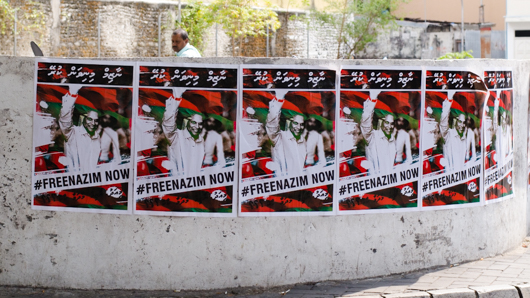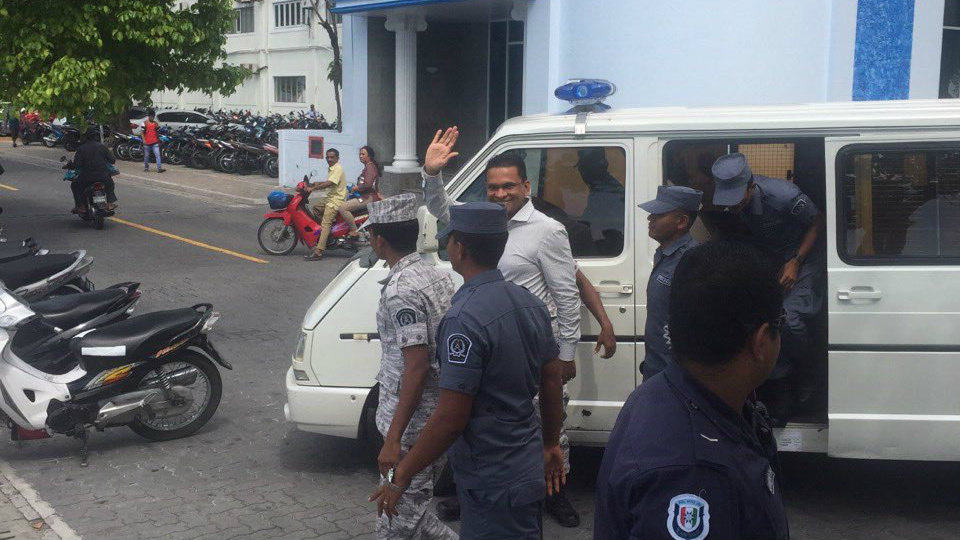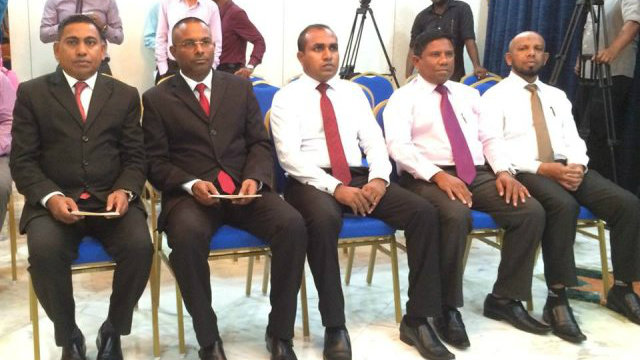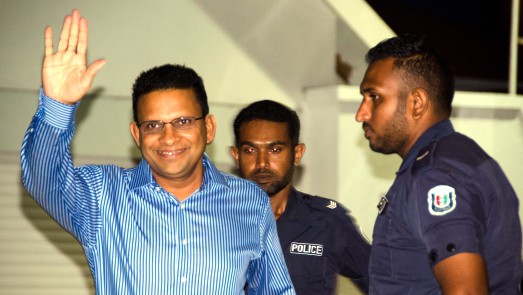The High Court today began hearings into an appeal filed by ex-defence minister Mohamed Nazim over a 11-year-jail term on weapons smuggling charges.
Nazim, who maintains he was framed by rogue police officers, highlighted several lapses in due process, including the criminal court’s refusal to call defence witnesses, discrepancies in testimony by anonymous police officers, and the police’s alleged failure to follow the law and standard procedures in the midnight raid on Nazim’s apartment.
The retired colonel was charged with smuggling weapons after masked police officers said they had discovered a pistol, three bullets, and a pen drive with documents detailing a plot to assassinate President Abdulla Yameen, inside a bedside drawer in Nazim’s apartment on January 18.
The rushed trial has been widely criticised for apparent lack of due process.
Five high court judges are presiding over Nazim’s appeal.
Presiding Judge Abdul Ganee Mohamed said hearings will be held daily, as agreed by Nazim’s lawyers and the Prosecutor General’s Office. Hearings are expected to conclude within the week and a verdict is expected soon.
Nazim was sentenced to jail on March 27.
He claims a team of Specialist Operations (SO) police officers had planted the weapons at his apartment on the orders of tourism minister Ahmed Adeeb.
Adeeb and Nazim had fallen out over the tourism minister’s alleged use of police officers to commit criminal activities including the cutting down of all of Malé City’s Areca palms in October last year, Nazim has alleged.
Adeeb has denied Nazim’s claims.
At today’s hearing, Nazim’s lawyers said the criminal court issued search warrant was invalid as police officers had provided false information to obtain it.
The court warrant was issued based on information provided by a senior officer and not based on intelligence reports, lawyers said.
While some police officers had said they did not know which floor they were to search for the weapons, another officer had testified in court that they were only instructed to search the eight floor of the apartment building, lawyers said.
The court warrant had authorized a search of the entire building. The discrepancies in police testimony on the floor to be searched showed they had lied to obtain the warrant and also demonstrated that the police were aware they would be searching the ex-defence minister’s apartment, lawyers said.
Nazim’s lawyers also said that criminal court judges prevented them from questioning the validity of the court warrant.
Police officers did not follow standard procedures during the raid on the apartment, lawyers said. A copy of the warrant was not provided to Nazim, and officers spent time unsupervised in Nazim’s bedroom before the search, they said.
Charges against Afaaf Abdul Majeed were dropped at the first hearing, claiming evidence from the pen drive indicated she had no connection to the weapons.
Lawyers argued charges should have been dropped against Nazim, too, claiming a police officer, who had conducted the analysis of the documents found in the pen drive, had said there was no evidence to suggest the weapons belonged to Nazim. The media was barred from the hearing in which the data analysis expert had testified.
Lawyers said they were blocked from mounting a defence because judges refused to call defence witnesses and because several key police witnesses were anonymous.
Noting discrepancies in testimony provided by police officers, Nazim’s lawyers accused them of lying under oath. Lawyers also accused public prosecutors of coaching witnesses, as they had admitted to meeting with witnesses before they appeared in court.
The criminal court prevented the ex-defence minister from making an independent analysis of the weapons and from collecting defence statements.
Public prosecutors will respond to Nazim’s appeal tomorrow.
Judges Abdul Ganee, Abdulla Hameed, Shuaib Hussain Zakariyya, Abbas Shareef and Abdul Rauf Ibrahim are overseeing Nazim’s appeal.
Two judges who oversaw Nazim’s trial, Abdulla Didi and Sujau Usman, were promoted to the High Court on June 8.
Nazim’s trial also coincided with a terrorism trial against ex-president Mohamed Nasheed. The opposition leader was sentenced to 13 years in jail on March 13.
He was tried by the three judges who oversaw Nazim’s trial.
The pair’s imprisonment has triggered a political crisis with daily protests from February through May, two mass demonstrations and hundreds of arrests.
Foreign governments, international organizations including the UN, and civil society groups have criticised the trials for apparent lack of due process. President Yameen, however, insists he has no constitutional authority to release the pair and says they must exhaust all appeal processes.
Nasheed’s lawyers were blocked from filing an appeal when the criminal court failed to issue the required case documents within a shortened 10-day appeal period.
The former president was temporarily transferred to house arrest today.
Likes (10)Dislikes
(10)Dislikes (0)
(0) 




